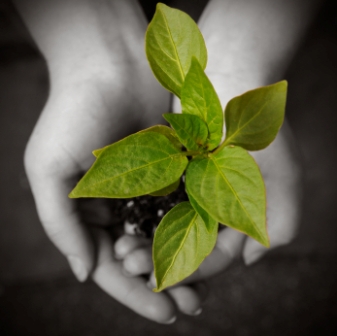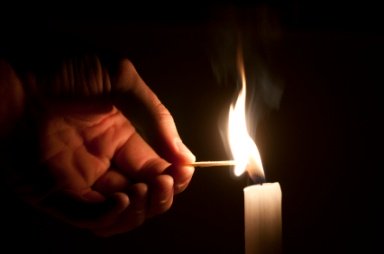Children and Bereavement
Children and bereavement will differ greatly from the way adults would go through bereavement. Adults grieve in their own way, at their own pace, and children do so as well. The bereavement process will continue and go through many changes during a lifetime.
Grief is an emotional reaction to loss. At one time, it was thought that children reacted to losing a loved one dear to them, the same way as an adult would. Now we know, that is not what happens.
Childhood bereavement varies according to the child's age. Other factors are the relationship to the deceased, the child's personality and prior expierence with loss.

Hands holding a young plant
Solace Among Friends
A young child might not cry, but may react by acting out. An older child or teen, might feel better to confide in peers.
When my son died, my teenage daughter sought solace among her friends. I would have liked to have been the one she had turned to, in this unsettling time. But she was drawn to her peer group--a group of friends that love her and knew her brother. I understood her reaction and did not take it personally.
She grew up with these friends and they are who she needed to be with at this time. There would be time later, for us.
Ways To Help
Children and Bereavement
Steps to Healing
There are several ways to help children and teens through the grieving process. Children and bereavement discussions should be age appropriate and tailored to each child.
* Be Honest
At this time, children need someone who can explain what is happening, in an honest manner. They need an adult they can trust, to not add to the confusion or uncomfortable feelings that may already be present.
* Let the child know, they are not to blame.
Reassure, that they are not responsible for what has happened.
* Be Open To Talk
When we would like to talk to children, they may not be ready to talk. Instead, look for opportunities that present themselves, as an opening to share feelings and discuss emotions.
* Be Open To The Quiet Ways of Healing
Writing private thoughts in a journal, writting a letter to someone not here, and art, are all outlets for expression of emotions.
* Talk to the other adults in your childs life,
such as their teachers. Get their support during this time.
* Offer your views on spirituality or faith, if appropriate.
Now would be the time to talk about the ceramonies that will be taking place.
* Be understanding and supportive of the obligations of the child.
School work and chores at home may need to be adjusted to the greiving child, and allow for change as needed.
* Help the child with keeping memories.
Gather things that are important to them, with them.
* Take advantage of outside resources.
There are trained professionals, to assist you and your child, should the need arise. Use them as necessary.
Age Related Response To Death
For A Child
Children and Bereavement
What to Expect
At different ages, children will have different understandings concerning death and the events surrounding it. The developmental stage of the child must be considered also.
InfantsInfants do not understand death. They do comprehend the relationship to their caregiver. If the caregiver bond is severed, the infant may show a lessened response to such things as a smile, be less active and not sleep as much as before. A loss in weight may follow.
Age 2-3 YearsAt this age, a child will react to being separated from someone and know that their world has changed. They may confuse death with sleep.
A reaction might be:
*To search for someone
*Crying
*A change in the sleep pattern
*A change in eating
There is still confusion at this age, in understanding the difference between death and sleep. They see death as something not permanent. There are questions as to how the person eats or plays. Often, they think they are responsible for the death or illness of another.
A reaction might be:
*Tantrums
*Fighting
*Crying
*Reverting to an earlier behavior, such as thumb sucking
*Fear of separation
There is a curiousity about death, at this age. It can be verbalized with a growing vocabulary. Questions about what happens when someone dies, are common. There is concern that an angel or a 'boogey man' can take people away.
A reaction might be:
*Agressive behavior
*Concentration problems at school
*Withdrawal
*Reverting to earlier behaviors
*Self-blame
By the ninth or tenth year, children have a better understanding of death. They know it is final, that everyone will die and that it will happen to them.
A reaction might be:
*Resentment
*A change in sleep patterns
*Crying
*Emotions not allowed to surface
*Changes with learning
*Withdrawal
At this time, teens are able to comprehend death, more fully. This is an age when they want to individualize and separate somewhat from the family. Tramatic events pull them back into the family circle.
At a time when teens are all about interacting with their peers,the death of a loved one can make them feel isolated and that they do not have anything in common with their friends.
During times of crisis, some teens will want to take over the responsibilities of the family.
Days and events important to the teen, may bring up emotions concerning the loved one.
A reaction might be:
* To say nothing at all
* A loss of appetite
* An empty feeling
* Sleeplessness
* Anger
* Caring for others to avoid their own feelings
* Mood Swings
* Dreams that are unsettling
Funerals and Children
Children and Bereavement-To Attend or Not?
Should children be allowed to attend a funeral? This decision is for you and your child to decide. It is appropriate for the child to be a part of the mourning ceremonies, if they want to.
Before the event, explain what will happen and how other people will react, such as crying.
This may be a difficult time for the parent, with their own grief, to care for the child at the funeral. A friend or family member should be available to assist you with the child, should the need arise. This person could also take the child out, if they want to leave before the service is over.
You Are Not Alone
Always know, that you do not have to do everything by yourself. There are grief counselors, professionals within the school system, and others, that will help you with children and bereavement at this difficult time.
Do look into the large resource of books and websites that are available for help with children and bereavement.
Return To Bereavement Articles
Follow To The Homepage From Children and Bereavement
Free E-Zine
Available
Popular Searches
- Bereavement Poem
- Be A Friend
- Healing Begins
- Garden Stones
- Inspirational Life Quotes
- Inspired Sayings
- Songs
- Bereavement
- Celebrate Life
- Contact
- Find It Here
Share Your Own
- Poems
- And Stories
Other Visitors Have
Inspire

Your presence we miss
Your memory we treasure
Loving you always
Forgetting you never
Unknown










